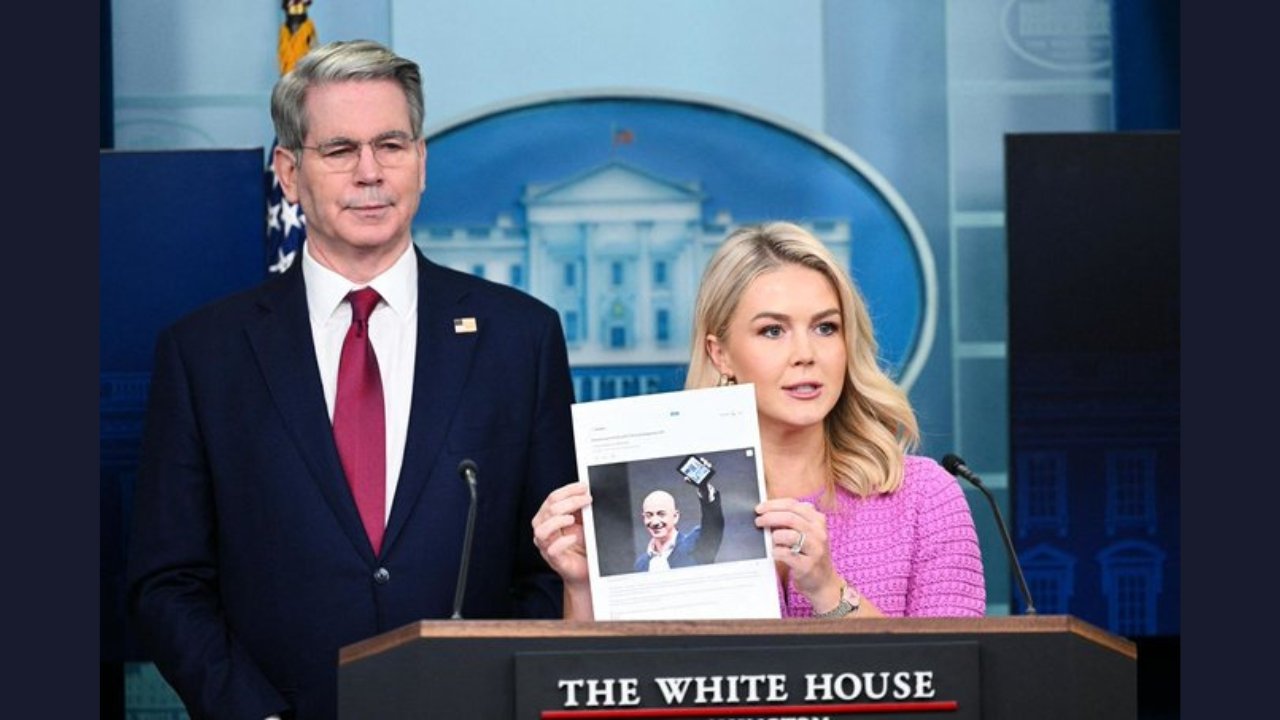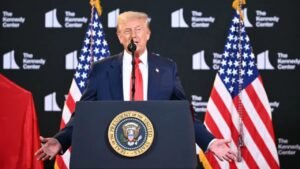Amazon Tariffs: White House Officials Were Pressed About These Tariffs And This New Amazon Move
White House officials were pressed about these tariffs and this new Amazon move just last hour. What do they say? Yeah, on the tariffs more broadly, you heard some optimism that there could be trade deals struck in the not too distant future from Treasury Secretary Scott Besson, who talked about the use of what he called euphemistically the president’s strategic uncertainty in his negotiating position over time here.
On Amazon, this report that Amazon might start listing the additional cost on specific items put in place by the tariffs. The president is clearly angry. White House Press Secretary Caroline Leavitt said she had spoken to him about it this morning. And the question, the idea that this shows factually that it is American consumers who pay the cost of tariffs, not the Chinese or any other foreign government, seemed to be the thing that set off the president’s anger.
Listen to how the White House Press Secretary addressed this issue. I just got off the phone with the president about Amazon’s announcement. This is a hostile and political act by amazon why didn’t amazon do this when the biden administration hiked inflation to the highest level in 40 years and i would also add that it’s not a surprise because as reuters recently wrote amazon has partnered with a chinese propaganda arm so this is another reason why americans should buy american.
So, just to clarify, not an announcement from Amazon, just a report at this juncture and something we should definitely watch closely given the White House’s response to it and how much attention we’ve all been paying to the relationship between President Trump and Amazon’s multi-billionaire owner, Jeff Bezos, now at least a bit rockier than it was this time yesterday. Yeah, Christine, before we go bigger picture on Trump’s first 100 days, talk about Amazon and the potential price difference they could be highlighting if they indeed Show what the tariffs cost.
Well, if you have 145% tariff on Chinese goods, any Chinese goods sold by Amazon then would have a higher cost. I mean, you think of it this way. You know, a $10,000 container of goods coming over would have a $14,500 tariff on it. I mean, that’s more than the cost of the goods is the cost of the tariff. That will clearly, clearly be a big cost difference for these sellers that are selling on Amazon.
What’s interesting to me is you’ve already seen Temu and Sheehan raise their prices. And one of those low cost retailers actually putting right in the cart to the cost of the import charge. A lot of people had noticed that over the past couple of days. So sort of breaking out the import charge. So we may see more retailers start to do that, although you can see from the White House they’re taking that if that were to happen at Amazon as a political move. It would be a sticker shock for consumers, though.
You also have reporting on tariff walkbacks, at least when it comes to the auto industry. It’s going to help the auto industry. What do we know? Well, Ana, that’s the way the White House and the Commerce Department is framing this new decision today, which is to basically say that the president’s 25% tariffs on automobiles and auto parts are the only tariffs that will apply to those businesses.
They won’t be stacked, if you will, on top of tariffs on steel and aluminum, which are obviously key components in cars, or added to tariffs that affect just Canada or just Mexico or just Germany, for example, places where we might import cars or parts. The idea is to make it a little bit simpler, a little bit easier for these auto companies to invest in the United States. So says the White House. But the price of cars is still going to go up.
These Tariffs & This New Amazon Move

And many of the companies, the big three, the domestic auto manufacturers, the parts manufacturers have responded tepidly, let’s say, to this announcement. It will help them, but it’s not the same as getting out from under. these more burdensome tariffs on the industry more broadly. And Christine, the president has faced backlash on the economy, largely driven by the tariffs, which continue to be a moving target.
Walk us through the president’s economic actions and the impact in these first 100 days of his administration. Well, it’s really the rollout and the strategy and what people who are business, people who are going to be at the other end of his tariffs see as a haphazard kind of implementation of his tariffs. I mean, here’s the recipe. of what we have are 145% on imports from China.
That is essentially grinding trade between the world’s two biggest economies to a halt. And that’s where we’ll be watching to see the goods that are still coming in. At what point will you begin to see those import surcharges on your bills? But the steel and aluminum, the USMCA, there already was a trade deal with Canada and Mexico that the president ripped up himself. So that Begs the question, you know, what kind of reliable trading partner is the U.S.? So this is what’s all on the table right now.
And then you look at what the stock market makes of that, as you pointed out in your intro. This is the worst performance for a first 100 days of a president since Richard Nixon, an almost 8 percent decline in the S&P 500, and roiled markets from the dollar and to the bond market as well. So just an awful lot of uncertainty. I will say there was a bank note this morning that said the first 100 days of dot, dot, dot. uncertainty.
So we’ll see if there’s more clarity from the president tonight about the next 100 days and what business and consumers can expect from that. And Shaq is joining us from the state where we’ll see President Trump head later today. The White House framing this first 100 days as a smashing economic success. Shaq, the polls show otherwise. You’ve spoken to Trump voters there in Michigan.
Where do they land? Well, Ana, in my conversations with Trump’s biggest supporters here, they acknowledge the reality that you guys are talking about. They see and feel the impacts of the tariffs. They see the softening market, the looming price increases because of the tariffs. But they say they are sticking with him for multiple reasons. One, they say this is what he promised on the campaign trail.
The White House Press Secretary Addressed This Issue

It came as no surprise to them, even with the impacts that we’re talking about. And two, They say that this is something that they believe in. It’s a mission they ultimately believe in and a goal of bringing back manufacturing to the United States. Listen to how his supporters explained it to me. Nobody likes to pay more for anything I don’t, but in the long run, I think it’s going to be good.
The tariffs, they don’t scare me at all. My money went down just like everybody else’s. My investments in there are coming right back up. It doesn’t faze me a bit. We owe a lot. You know, we’re in a lot of debt. And if those tariffs are going to help bring back more to our economy, I’m all for it. Anna, in some cases you heard some of his supporters essentially repeating the analogy that he uses sometimes when he talks about a sick patient and that you might have some tough moments in the beginning, but this is ultimately going to lead to a country that is stronger and healthier.
It’s clear that his base is sticking with him, even as when you look at polling among the general population, this is an issue that shows to be pretty risky for his presidency. Jack Brewster, I always appreciate your reporting there. Thank you, John. You write about this really seismic, unilateral approach in terms of the actions President Trump has taken so far.
You write, in times of war and economic crisis, past presidents from Lincoln to Roosevelt have tested the constitutional limits of their office. None have tried to exercise so much power across such a broad range of issues and with such disregard for Congress and the courts. as Trump has in a time of relative peace and economic stability.
John, it strikes me that this is a Republican president who has a GOP majority in both chambers of Congress, yet he has signed fewer bills into law than his predecessors, going back to Eisenhower. Is that by design? I think it largely is, Ana. I mean, the president had the ability, if he wanted to, to come in and work with Congress and do some major things, and he’s absolutely ignored Congress.
His aides say—I talked to Caroline Levitt, the White House press secretary, last week—that he will be focused on getting a deal on the budget reconciliation bill. Of course, the White House uses the term deal all the time, even when they’re only negotiating with their own side, which is basically what’s happening here. But she says that they’ll be focused on that in the next 100 days. I think Trump wanted to hit the ground running. I think he promised to hit the ground running.
And this has been breathtaking, whether you are a fan of his or a critic of his, whether you see what he’s doing as necessary, regardless of the law, if you see it as both unnecessary and potentially breaking some of the laws we’ve seen courts push back on him, however you see it, this is breathtaking. We haven’t seen anything like this in terms of the size and scope of change in such a short period of time.
Yeah, no doubt. And Christine, we heard there with Shaq that there are Trump supporters who say they’ll be patient. Sure. They’re really buying the line. Just wait. You know, give me time to let these policies take effect. Well, we have some new reporting, new warnings about when these tariffs will be felt and how severe an impact. Let me be clear. If consumers have to pay more for a set of sheets, that is not the end of the world. Right. I mean, the consumers are so used to very, very cheap goods.
That’s not what the issue here is. The issue is the way that trade has been just thrown off a cliff. You’re going to have longshoremen. You’re going to have truckers. You’re going to have the people who handle all these goods will be seeing layoffs. We’ve seen from the big West Coast longshoremen and warehouse union.
They say that this is a war on the working people and that the first Trump tariffs didn’t result in companies moving wholesale their operations back to the U.S. It just was a bigger burden on the people who pay for it, the people who work in these industries. So a big concern from this big union that this is going to be a problem. And we’ve been checking sort of our channels with freight and logistics, and already you’re seeing trucker layoffs, our sources are telling us.
So these are working people who may have voted for donald Trump, who instead of just the pain of maybe paying more for your everyday goods, we’re talking about a reordering of working class, working class parts of the american economy. And if you have a recession, So many economists tell me the first jobs to go in a recession are manufacturing jobs. So in a policy that’s meant to restore manufacturing, the first fallout will be in manufacturing if you don’t pull this off exactly right.














Post Comment